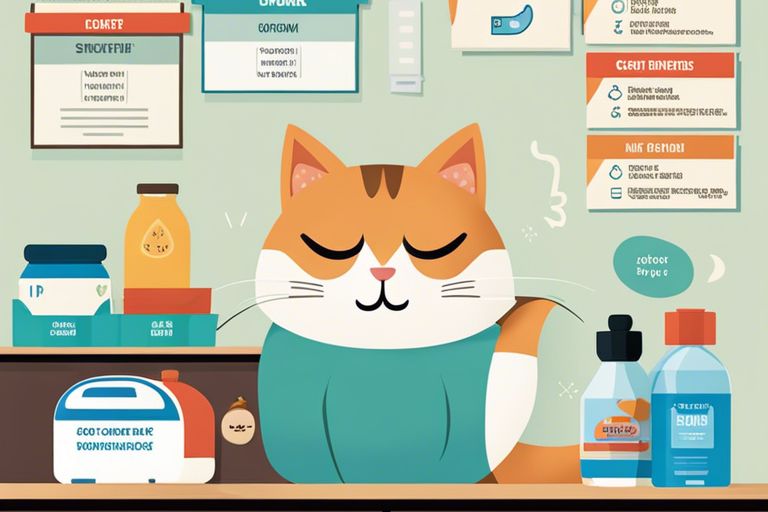Dealing with a cat that has a sensitive stomach can be a frustrating and concerning experience. If you’ve noticed that your feline friend frequently experiences vomiting, diarrhea, or gastrointestinal discomfort, you may be wondering if it’s normal for your cat to have a sensitive stomach. In this blog post, we’ll dive into the topic of cat digestive health and explore some of the potential causes and solutions for a sensitive stomach. By understanding what’s considered normal for your cat’s digestive system, you can take proactive steps to improve their overall well-being.
Key Takeaways:
- Sensitivity may be normal: It is not uncommon for cats to have sensitive stomachs, resulting in occasional digestive issues.
- Food intolerance may be a factor: Some cats may have intolerance to certain ingredients, leading to gastrointestinal discomfort.
- Environmental stress and changes: Changes in a cat’s environment, such as moving to a new home or the introduction of a new pet, can lead to stomach sensitivity.
- Consulting a veterinarian is important: Persistent gastrointestinal issues should be addressed by a veterinarian to rule out any underlying health concerns.
- Dietary adjustments may be necessary: Switching to a specialized diet or providing smaller, more frequent meals may help manage a cat’s sensitive stomach.
Identifying Sensitive Stomach Symptoms
Some cats may have a sensitive stomach, which can lead to a variety of symptoms. It’s important to be able to recognize when your cat is experiencing digestive issues so that you can provide the proper care and treatment.
Common Signs and Behaviors
Common signs of a sensitive stomach in cats include vomiting, diarrhea, constipation, lack of appetite, and frequent grooming or licking of the abdomen. You may also notice changes in your cat’s litter box habits, such as straining in the litter box or producing unusually foul-smelling stools. Keep an eye on your cat’s behavior as well, as lethargy, hiding, or irritability can also indicate discomfort in the digestive system.
When to be Concerned
If you notice any of these symptoms persisting for more than a day or occurring frequently, it’s important to seek veterinary attention. Chronic vomiting or diarrhea can lead to dehydration and other health complications, so it’s crucial to address these issues as soon as possible. Additionally, if you observe blood in the vomit or stool, or a sudden change in your cat’s overall health and energy levels, it’s time to consult with your veterinarian to rule out any serious underlying conditions.
Causes of Sensitive Stomachs in Cats
Clearly, as a cat owner, you may be concerned about your feline friend’s sensitive stomach. The causes of sensitive stomachs in cats can vary, and it’s important to understand the potential triggers so that you can provide the best care for your pet. If you want to delve deeper into this topic, you can read Does your pet have a sensitive stomach? Here’s how to tell …
Dietary Factors
When it comes to sensitive stomachs in cats, dietary factors can play a significant role. Your cat may have trouble digesting certain ingredients, such as grains, dairy, soy, and artificial additives. These ingredients can lead to gastrointestinal upset, causing symptoms like diarrhea, vomiting, and flatulence. It’s vital to pay attention to your cat’s response to different foods and consider switching to a limited ingredient diet or one formulated for sensitive stomachs. Knowing what to look for on the label can help you make the best choice for your pet.
Health-Related Issues
Another potential cause of a sensitive stomach in cats is health-related issues. These can include conditions such as inflammatory bowel disease, pancreatitis, and food allergies. If your cat is experiencing ongoing gastrointestinal distress, it’s essential to consult with your veterinarian. They can perform diagnostic tests to identify any underlying health issues and provide appropriate treatment. Addressing these health concerns is crucial for managing your cat’s sensitive stomach and improving their overall well-being.
Managing and Treating Sensitivity
Unlike humans, cats cannot communicate when they are feeling unwell, making it challenging to identify and manage stomach sensitivity. However, there are several approaches you can take to manage and treat your cat’s sensitive stomach. These include nutritional adjustments and medical interventions that can help alleviate your cat’s discomfort and improve their overall digestive health.
Nutritional Adjustments
If your cat has a sensitive stomach, making nutritional adjustments can have a significant impact on their digestive health. Start by feeding your cat a high-quality, easily digestible diet that is specifically formulated for sensitive stomachs. Look for foods that are labeled as “digestive care” or “easy on the stomach,” as they are designed to be gentle on your cat’s digestive system. Additionally, consider feeding your cat smaller, more frequent meals to reduce the strain on their stomach and prevent episodes of vomiting or diarrhea. It’s essential to monitor your cat’s response to dietary changes and consult with your veterinarian for personalized recommendations.
Medical Interventions
If your cat’s sensitivity persists despite dietary adjustments, medical interventions may be necessary to manage their condition. Your veterinarian may recommend medications such as antacids, anti-nausea drugs, or probiotics to help alleviate your cat’s gastrointestinal symptoms. In some cases, your cat may require diagnostic tests, such as blood work, X-rays, or ultrasounds, to identify any underlying medical conditions contributing to their sensitivity. If your cat’s sensitivity is severe or persistent, your veterinarian may refer you to a veterinary specialist for further evaluation and treatment.
Prevention and Long-Term Care
To ensure long-term digestive health for your cat, it’s important to take proactive steps to prevent stomach sensitivity and to maintain your cat’s overall well-being. By implementing these preventive measures and providing regular care, you can help alleviate your cat’s stomach sensitivities and promote a healthy digestive system.
Best Feeding Practices
When it comes to feeding your cat, consistency and quality are key. Stick to a regular feeding schedule and avoid sudden changes in diet, as this can upset your cat’s stomach. Additionally, choose high-quality, easily digestible cat food that is formulated specifically for sensitive stomachs. Look for options that are free from artificial additives and fillers, and consider consulting with your veterinarian for recommendations based on your cat’s specific needs. It’s also important to monitor your cat’s food intake and ensure they are not overeating, as excess food can lead to digestive issues.
Importance of Regular Veterinary Checkups
Regular veterinary checkups are crucial in maintaining your cat’s overall health, including their digestive system. Your veterinarian can help identify and address any underlying medical conditions that may be contributing to your cat’s stomach sensitivity. Additionally, they can provide guidance on proper nutrition, dietary supplements, and lifestyle adjustments to support your cat’s digestive health. By scheduling routine checkups, you can catch any potential issues early and take proactive measures to keep your cat healthy and comfortable.

Is it normal for my cat to have a sensitive stomach?
Hence, it is not uncommon for cats to have sensitive stomachs. Just like humans, cats can also experience gastrointestinal issues and may have trouble digesting certain foods. However, if you notice that your cat is frequently experiencing digestive problems, it is important to consult with a veterinarian to rule out any underlying medical conditions and to determine the best course of action. Making dietary adjustments and providing proper care and attention can help manage your cat’s sensitive stomach and ensure its overall well-being
FAQ
Q: Is it normal for my cat to have a sensitive stomach?
A: Yes, it is relatively common for cats to have sensitive stomachs. Some cats may experience gastrointestinal issues due to dietary sensitivities, stress, or underlying health conditions.
Q: What are the symptoms of a sensitive stomach in cats?
A: Cats with sensitive stomachs may display symptoms such as vomiting, diarrhea, constipation, decreased appetite, weight loss, and excessive flatulence. It is important to monitor your cat’s behavior and take note of any changes in their eating habits or litter box routine.
Q: How can I help my cat with a sensitive stomach?
A: To help your cat with a sensitive stomach, you can try feeding them a high-quality, easily digestible cat food that is formulated for sensitive stomachs. It is also important to minimize stress, provide a consistent feeding routine, and ensure your cat has access to fresh water at all times. If your cat’s symptoms persist, it is recommended to consult with a veterinarian to rule out any underlying health issues.

Jayley, a devoted cat enthusiast, also writer for other cat blog as well. She aims to dedicated to providing comprehensive information, insights, and advice on everything you’d ever want to know about our whiskered companions.
